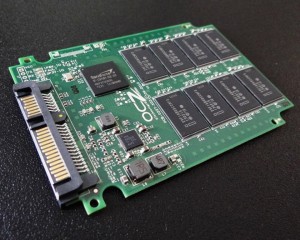 Realignment of priorities with respect to solid state storage at OCZ came as no surprise considering the turbulence of the past two years resulting in Ralph Schmidt’s appointment as the new CEO and the abrupt exit of Ryan Petersen from this part of the world.
Realignment of priorities with respect to solid state storage at OCZ came as no surprise considering the turbulence of the past two years resulting in Ralph Schmidt’s appointment as the new CEO and the abrupt exit of Ryan Petersen from this part of the world.
The unchallenged leader of SSD models is now reducing it’s consumer line to just four models and, just as unexpectedly, the ‘LSI SandForce Driven’ Vertex 3.20 gets a refresh and remains in that mix.
Understanding that the OCZ Vertex 3 SSD is probably one of the most popular SSDs of the past few years, OCZ’s retention of this drive might not be such a shock to most but, competitiveness aside, OCZ now had the opportunity to ‘cleanse’ their product line with in house design.
As shown at ceBIT Germany 2013 earlier this month, the OCZ consumer SSD family consists of the Vertex 3.20, Vertex 4, Vector and Vector PCIe. Let’s take a closer look at the 20nm refreshed Vertex 3, OCZ’s new value offering…
OCZ VERTEX 3.20 INTRODUCTION
The OCZ Vertex 3.20 SATA 3 SSD is a refresh of the Vertex 3 as OCZ has moved to Intel’s 20nm MLC NAND flash memory from the previous size of 25nm. The Vertex 3.20 is available in capacities of 120 and 240GB, with a 480GB size expected in the near future. Looking at the OCZ website, they have the V3.20 placed right beside the presumably ‘EOL’ Agility 3 in the ‘Mainstream Performance’ Section, with the former Vertex 3 still listed in the ‘High Performance’ area. With listed specs of 550MB/s read and 520MB/s write with up to 90,000 IOPS at low 4k aligned random disk access for the V3.20, we don’t think we will be seeing that large of a performance gap between old and new.

 The Vertex 3.20 is available presently and can be found at Amazon
The Vertex 3.20 is available presently and can be found at Amazon![]() at prices of $119 (120GB) and $219 (240GB) which is typical for new release SSDs.
at prices of $119 (120GB) and $219 (240GB) which is typical for new release SSDs.
OCZ VERTEX 3.20 SSD COMPONENTS
The OCZ Vertex 3.20 SSD is a SATA 3 SSD and contains the LSI SandForce SF-2281 flash storage processor (FSP) along with 16 modules of Intel 20nm synchronous NAND flash memory, eight on each side of the printed circuit board.
Each module is 16GB in size for a total of 256GB RAW capacity, however, the LSI SandForce processor merits proprietary use of a 16GB module for both firmware and over provisioning needs, leaving us with the 240GB advertised capacity. Once formatted, the end user has 224GB of storage available for their use.
 The SSD Review The Worlds Dedicated SSD Education and Review Resource |
The SSD Review The Worlds Dedicated SSD Education and Review Resource | 
Nice review as always Les! I can’t believe this kind of low performance in 2013!
Well i guess we won’t see anything better than my 840pro until the next gen SATA…
Vector is faster than your 840 Pro especially with Vectors newly released FW 2.0 lol..
Nice catch! Any reviews backing that up? Because that 4k read of 30mb/s looks lower than the 40mb/s the 840 manages… lol!
so your basing the total speed of the drive on 1 metric? I heard the new firmware bumps that up actually but the vector kills the 840 pro is steady state performance as well as in writes..
https://techreport.com/review/23990/samsung-840-pro-series-ssd-reviewed/10
“The Samsung 830 Series was only recently unseated from the top of our
overall performance rankings by the OCZ Vector. While the 840 Pro is an
improvement over its predecessor, it’s not fast enough to match the
Vector.”
So what? I said we won’t see something faster. This tiny advantage in write speed is enough for you to call it faster? I whould hardly call it a tie as a number of benchmarks like Vantage, Pcmark07, even AnandTech’s Storage Bench which is mighty similar to our every day usage, suggest 840 is a little faster overall. That said, steady state is indeed Vectors strong point and i admit that although the latest firmware improved the 840 steady state perf, vector scores here.